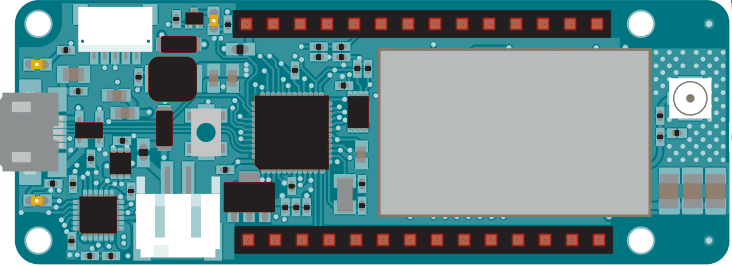
In this example, you will use your MKR NB 1500, to query a Network Time Protocol (NTP) server. In this way, your board can get time from Internet.
antenna
SIM card enable for Data

/*H*******************************************************
Udp NTP Client
Get time from a Network Time Protocol (NTP) time server
Demonstrates use of UDP sendPacket and ReceivePacket
For more on NTP time servers and messages needed to communicate with m,
see http://en.wikipedia.org/wiki/Network_Time_Protocol
created 4 Sep 2010 by Michael Margolis
modified 9 Apr 2012 by Tom Igoe
modified 6 Dec 2017 ported from WiFi101 to MKRGSM by Arturo Guadalupi
********************************************************/
#include <MKRNB.h>
#include "arduino_secrets.h"
//************************* DEFINES ************************************
#define BAUD 9600
typedef unsigned long ulong;
typedef unsigned int uint;
//************************* PROTOTYPES ************************************
ulong sendNTPpacket( IPAddress& address);
//************************* VARIABLES ************************************
// UDP INSTANCE TO SEND AND RECEIVE PACKETS OVER UDP
NBUDP Udp;
NBClient Client; // INITIALIZE LIBRARY INSTANCE
GPRS Gprs;
NB nbAccess;
// ENTER SENSITIVE DATA IN Secret tab OR arduino_secrets.h PIN NUMBER
const char PINNUMBER[] = SECRET_PINNUMBER;
uint localPort = 2390; // LOCAL PORT TO LISTEN FOR UDP PACKETS
IPAddress timeServer( 129, 6, 15, 28); // time.nist.gov NTP server
const int NTPPKTSIZ = 48; // NTP TIME STAMP IN MSG FIRST 48 BYTES
byte PktBuff[NTPPKTSIZ]; // INCOMING AND OUTGOING PACKETS
/*F********************************************************************
*
**********************************************************************/
void
setup()
{
// Open serial communications and wait for port to open:
Serial.begin( BAUD );
while( !Serial )
{ ; } // WAIT FOR SERIAL PORT TO CONNECT. (FOR NATIVE USB PORT ONLY)
Serial.println( "Starting Arduino GPRS NTP client.");
boolean connected = false; // CONNECTION STATE, LOGIN AND PASSWORD
while( !connected )
{ // ATTACH SHIELD TO GPRS NETWORK WITH APN
if( (nbAccess.begin( PINNUMBER ) == NB_READY)
&& (Gprs.attachGPRS() == GPRS_READY))
connected = true;
else
{
Serial.println( "Not connected");
delay( 1000 );
}
}
Serial.println( "\nStarting connection to server...");
Udp.begin( localPort ); // AFTER STARTING MODEM NB.begin()
}
/*F********************************************************************
*
**********************************************************************/
void
loop()
{
sendNTPpacket( timeServer ); // SEND AN NTP PACKET TO TIME SERVER
delay( 1000 ); // WAIT TO SEE IF A REPLY IS AVAILABLE
if( Udp.parsePacket() )
{
Serial.println("packet received");
Udp.read( PktBuff, NTPPKTSIZ ); // READ PACKET
// TIMESTAMP(FOUR BYTES) @ RCVD PKT[40]
// TWO WORDS, LONG. fIRST, ESXTRACT WORDS:
ulong highWord = word( PktBuff[40], PktBuff[41] );
ulong lowWord = word( PktBuff[42], PktBuff[43] );
// JOIN FOUR BYTES (TWO WORDS) INTO LONG INT
// THIS IS NTP TIME (SECONDS SINCE jAN 1 1900):
ulong secsSince1900 = highWord << 16 | lowWord;
Serial.print("Seconds since Jan 1 1900 = " );
Serial.println(secsSince1900);
// CONVERT NTP TIME INTO EVERYDAY TIME:
Serial.print("Unix time = ");
// UNIX TIME STARTS ON JAN 1 1970. IN SECONDS, THAT'S 2208988800:
const unsigned long svntyYrs = 2208988800UL;
unsigned long epoch = secsSince1900 - svntyYrs;// SUBTRACT SVNTY YRS:
Serial.println( epoch ); // PRINT UNIX TIME:
// PRINT HOUR, MINUTE AND SECOND
Serial.print("The UTC time is "); // UTC IS @ GREENWICH mERIDIAN (GMT)
Serial.print( (epoch % 86400L) / 3600);// PNT HR (86400 =SECS PER DAY)
Serial.print( ':' );
if( ((epoch % 3600) / 60) < 10 )
Serial.print('0'); // CORRECT LEADING ZRO
Serial.print((epoch % 3600) / 60); // PNT MIN (3600 == SECS PER MIN)
Serial.print(':');
if( (epoch % 60) < 10 )
Serial.print( '0' ); // FIX LEADING ZRO
Serial.println( epoch % 60 ); // PRINT SECOND
}
delay( 10000 ); // WAIT TEN SECONDS BEFORE ASKING FOR TIME AGAIN
}
/*F********************************************************************
* SEND AN NTP REQUEST TO TIME SERVER AT GIVEN ADDRESS
**********************************************************************/
unsigned long
sendNTPpacket( IPAddress& address)
{
// Serial.println( "1" );
memset( PktBuff, 0, NTPPKTSIZ );
// INIT VALS FOR NTP REQUEST (see URL above for PKT details)
// Serial.println("2");
PktBuff[0] = 0b11100011; // LI, Version, Mode
PktBuff[1] = 0; // Stratum, or type of clock
PktBuff[2] = 6; // Polling Interval
PktBuff[3] = 0xEC; // Peer Clock Precision
// 8 bytes of zero for Root Delay & Root Dispersion
PktBuff[12] = 49;
PktBuff[13] = 0x4E;
PktBuff[14] = 49;
PktBuff[15] = 52;
// Serial.println("3");
// ALL NTP FIELDS ARE SET, SEND PACKET REQUESTING TIMESTAMP:
Udp.beginPacket( address, 123); // NTP REQUESTS ARE TO PORT 123
// Serial.println( "4" );
Udp.write( PktBuff, NTPPKTSIZ);
//Serial.println( "5" );
Udp.endPacket();
//Serial.println( "6" );
}
GPRS Constructor
NBClient Constructor
ready ()
connect ()
beginWrite ()
write ()
endWrite ()
connected ()
read ()
available ()
peek ()
flush ()
stop ()
Arduino MKR NB 1500 - Complete product description.
Getting started with MKR NB 1500 - Get everything set up in minutes.
MKRNB library - Your reference for NB Library.
MKRNBToolsTestGPRS - Tries to access internet over GPRS.